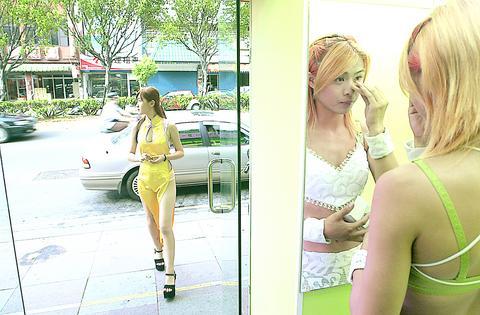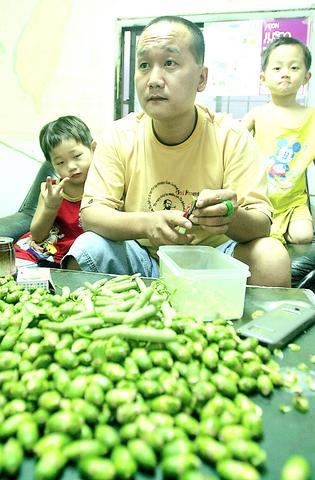Around 9am, Wu Sheng-kuang (
On the wall is a card with employee regulations: makeup must be worn at all times when working; employees should clock in only after changing and putting on makeup. After the girls arrive, Wu rolls up the iron doors and switches on the neon lights of his glass booth. His shop, Hot China Girls (
The shop is right next to the highway entrance going from Hsinchu to Taipei, a perfect location for the glass showcases from which the betel nut beauties peddle their wares. Along a 100m stretch of road there are seven betel nut stands, each decorated with colorful neon. In between there are stalls selling Hsinchu specialties such as rice noodles and meatballs. Wu owns two of these stalls and another betel nut stall called Miss China (中國小姐), only a few meters away from Hot China Girls.

PHOTO: GEORGE TSRONG, TAIPEI TIMES
Wu has been running betel nut stands for more than 10 years, and says he was one of the first to set up at this location. From the start, he decided that girls were to be a major part of the operation. "I knew that the girls would be the key to my business, so I treat them very well," he said.
Wu said he pays the girls NT$40,000 a month. He also buys them sexy costumes and platform shoes. "If the girls wear clothes they don't like, they feel unhappy and are less motivated. This is bad for business," Wu said.
It is a woman's world inside the glass betel nut stand. The small counter is covered with cosmetics: Japanese eye-shadow cases, shiny colored lipsticks and mascara. On the side in the small cabinet, there are piles of sexy costumes. They are all very skimpy so they don't take up much space.

Wu does not show up at the betel nut stand very often, spending most of his time upstairs preparing the betel nuts, but keeping an eye on the girls and business generally through surveillance cameras. "If there is a man inside the stall, customers will not usually approach the stall," he said.
When reporting this story, Wu asked our male photographer not to stand inside the stall for too long. He said to me: "You're a girl. It's OK for you to stay here." This was simply for the good of his business.
Ting-ting (

Like her work mates Hsiao-yeh (
According to Wu, the girls at his stand can enjoy the most luxurious treatment. They don't need to prepare the betel nuts themselves, as all the nuts are prepared and packed before hand. All they need to do is welcome customers who pull up by the stall. They are basically sales girls. "If you sell more than NT$10,000 a day, you get a bonus of NT$300," Wu said.
Pretty girls have become so much part of the business that Wu is willing to spend between NT$1,000 to NT$3,000 per dress for the girls. Despite this expense, Wu says he still manages a net profit of at least NT$100,000 a month. And that is just from Hot China Girls.
Hsiao-min, 19, a student at a technical college, also takes an afternoon shift. She wears a long yellow dress that is slit almost up to her waist. Hsiao-yeh, 18, her companion on the shift, wears a white tank top and mini-skirt.
Both Hsiao-yeh and Hsiao-min's clothes were designed by Annie (who declined to give her last name), the owner and designer of Annie's Hot Girl Costume Workshop (
Every day, Annie drives her van, stopping at betel nut stands across the island promoting her betel nut beauty costumes. In six years, she has become a major clothing supplier for Wu's betel nut stall. "On average, I stop at around five to 10 betel nut stands a day, showing samples to the owners," Annie said. She said she is the only supplier who provides designs specifically targeted at betel nuts girls.
Annie, who has many friends working in the betel nut industry, said that her clothes gave the girls more style than those purchased at the night markets. Her business has now expanded to providing clothes for girls working in clubs and bars and for girls working in motor racing venues such as Lungtan in Taoyuan County.
For the girls like Hsiao-yeh and Hsiao-min, apart from the long hours standing in high heels, this is not a bad job. You can wear fancy clothes at work and listen to your favorite music. Once in a while, admirers give them red envelopes of money, flowers or expensive gifts. On the counter, there is a big bouquet of flowers sent by an admirer of Hsiao-yeh's. Hsiao-min is even luckier. She was given the latest pink Panasonic mobile phone by an admirer. Last month, she also received a gold necklace.
"Some of the customers have become friends and sometimes they'll even buy you a lunch box," said Hsiao-yeh. When faced with customers who want more than just betel nuts, Hsiao-yeh said they are sent packing: "We just give them a cold look and say we don't sell that here."
For customers who think they can take advantage, Wu said they might find themselves beaten up. "We make them apologize and they must give the girls a considerable sum of money in a red envelope," Wu said.
Wu acknowledged that some stands had girls who wore no underwear or who were available for sexual services, but insisted that his stalls had nothing to do with that aspect of the business. "Our main business is to sell betel nuts and the most important part is that you have to have pretty girls," he said.
"Besides, those who offer sex are mostly the ugly girls," he added.

In recent weeks the Trump Administration has been demanding that Taiwan transfer half of its chip manufacturing to the US. In an interview with NewsNation, US Secretary of Commerce Howard Lutnick said that the US would need 50 percent of domestic chip production to protect Taiwan. He stated, discussing Taiwan’s chip production: “My argument to them was, well, if you have 95 percent, how am I gonna get it to protect you? You’re going to put it on a plane? You’re going to put it on a boat?” The stench of the Trump Administration’s mafia-style notions of “protection” was strong

Every now and then, it’s nice to just point somewhere on a map and head out with no plan. In Taiwan, where convenience reigns, food options are plentiful and people are generally friendly and helpful, this type of trip is that much easier to pull off. One day last November, a spur-of-the-moment day hike in the hills of Chiayi County turned into a surprisingly memorable experience that impressed on me once again how fortunate we all are to call this island home. The scenery I walked through that day — a mix of forest and farms reaching up into the clouds

With one week left until election day, the drama is high in the race for the Chinese Nationalist Party (KMT) chair. The race is still potentially wide open between the three frontrunners. The most accurate poll is done by Apollo Survey & Research Co (艾普羅民調公司), which was conducted a week and a half ago with two-thirds of the respondents party members, who are the only ones eligible to vote. For details on the candidates, check the Oct. 4 edition of this column, “A look at the KMT chair candidates” on page 12. The popular frontrunner was 56-year-old Cheng Li-wun (鄭麗文)

“How China Threatens to Force Taiwan Into a Total Blackout” screamed a Wall Street Journal (WSJ) headline last week, yet another of the endless clickbait examples of the energy threat via blockade that doesn’t exist. Since the headline is recycled, I will recycle the rebuttal: once industrial power demand collapses (there’s a blockade so trade is gone, remember?) “a handful of shops and factories could run for months on coal and renewables, as Ko Yun-ling (柯昀伶) and Chao Chia-wei (趙家緯) pointed out in a piece at Taiwan Insight earlier this year.” Sadly, the existence of these facts will not stop the